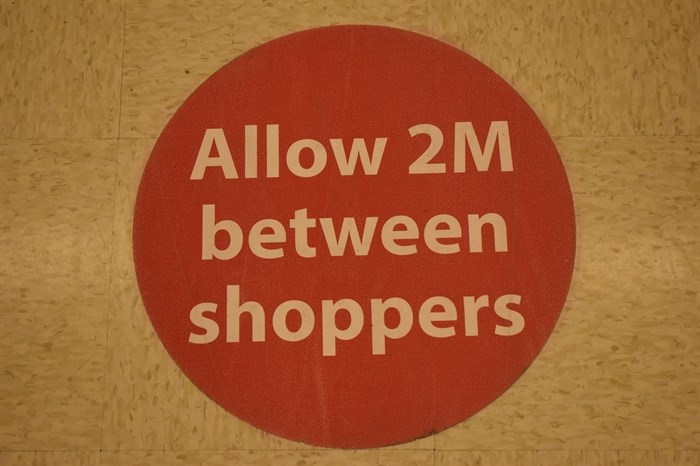
Social distancing decals remind customers in grocery store to remain 2 feet apart.
(BRIE WELTON / iNFOnews.ca)
April 13, 2020 - 7:00 AM
Before Cody Younker even got involved, he knew what was going on. He's the manager of a grocery store in Revelstoke and last week heard his deli staff trying to enforce physical distancing rules by asking a woman to step back.
He tried to defuse the situation but with this customer that wasn’t going to happen.
"I approached her and asked her to step back which she refused to, saying this whole thing has been blown completely out of proportion and it’s bullshit,” he said.
She got aggressive and loud and said the whole pandemic is a hoax.
"She proceeded to cough in my direction, and I actually felt it on my body. And she said 'there you go, if I’m sick now you’re sick too,'” he said. "That was pretty disgusting."
By now, perhaps you’ve heard of or witnessed people like this who not only refuse to abide by physical distancing rules, they provoke those who do — people who crowd lines in stores or refuse to move when walking too close, tell everyone they're foolish and either cough or pretend to cough at people. It’s happened to police officers so many times, the head of the Canadian Police Association felt the need to remind people that it’s a form of assault.
It’s certainly disturbing, perhaps criminal, but UBC Psychology Professor Dr. Anita DeLongis says her research has shown it’s also inevitable.
DeLongis and her team are following up on research conducted since 2002 with the SARS outbreak, and continued with the West Nile and H1N1 virus outbreaks to study psychological reactions to a pandemic. They’re trying to predict who will follow important health directions and those who won’t.
“We’re seeing exactly the same pattern,” DeLongis said.
It appears to come down to empathy. People who are empathetic “are engaging in social distancing regardless of whether or not they personally feel the disease is threatening,” DeLongis said. “In our findings, we are seeing people who are low in empathy… they’re self-reporting that they are not socially distancing unless they feel really personally threatened."
However, the behaviour from the woman in the Revelstoke deli goes beyond lack of empathy and into denial.
"She’s expressing a lot of denial about this disease, she’s saying it’s a hoax,” DeLongis said. "It’s very clear this is not a hoax.”
Based on her studies from the SARS outbreak, DeLongis said that this woman’s behaviour is perfectly predictable.
"If you engage in denial you’re less likely to engage in health behaviours that are recommended by the (World Health Organization) and the (Centers for Disease Control), and you’re more likely to engage in discrimination and aggressive kinds of responses,” she said.
"That’s really consistent with our findings, even though (the Revelstoke woman) is a particular individual that we can’t really speak to.”
What DeLongis can’t tell us is what we should do when we encounter it. Violating swiftly adopted social distancing rules is far beyond rude, it's aggressive.
Younker threatened to call the RCMP to escort the customer from the property but she was unfazed. She grabbed her meat and went to the register, causing another fuss because bottle returns were discontinued before finally leaving.
"I was just astonished at what had just happened," he said. "I was a little shaken up by that."
Younker said it was the only aggressive incident they've had during the pandemic.
"We’ve had a few customers in the store that have still been somewhat upset with the procedures and regulations we’ve put in place," he said. "But honestly, about 99.9% of people have been really thankful for what we’re doing so they can continue to shop."
DeLongis and her team will continue to study behaviours and coping methods during the COVID-19 pandemic, looking at the more subtle reactions of not following public health orders, to micro-aggression and open hostility and denial.
The survey is still open for new participants to share their experiences with COVID-19.
To contact a reporter for this story, email Brie Welton or call (250) 819-3723 or email the editor. You can also submit photos, videos or news tips to the newsroom and be entered to win a monthly prize draw.
We welcome your comments and opinions on our stories but play nice. We won't censor or delete comments unless they contain off-topic statements or links, unnecessary vulgarity, false facts, spam or obviously fake profiles. If you have any concerns about what you see in comments, email the editor in the link above.
News from © iNFOnews, 2020